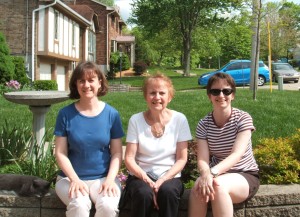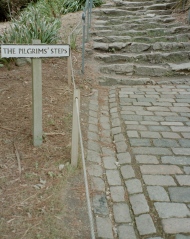 Stained glass images in walls of stone reached the heights of the vaulted ceiling, holding my gaze; while, at eye level, Ruben’s painting of The Adoration of the Magi behind the altar moved me into a posture of humility. Sitting down, I touched the worn, dark wood of the choir stalls that carried memories of the centuries of fellows and students who have rested here for worship. The scents of wax from rows of burning candles and of stones from taken from the ground centuries before filled the space. Soon organ and choral music added to the tapestry of this space as voices affirmed the age-old creeds and prayers, and the words of scripture and the sermon spoke of a marvelous story – The Story. Finally, I tasted the bread and wine – the body and blood – that drew together the people in community here at Kings College Chapel in Cambridge, England.
Stained glass images in walls of stone reached the heights of the vaulted ceiling, holding my gaze; while, at eye level, Ruben’s painting of The Adoration of the Magi behind the altar moved me into a posture of humility. Sitting down, I touched the worn, dark wood of the choir stalls that carried memories of the centuries of fellows and students who have rested here for worship. The scents of wax from rows of burning candles and of stones from taken from the ground centuries before filled the space. Soon organ and choral music added to the tapestry of this space as voices affirmed the age-old creeds and prayers, and the words of scripture and the sermon spoke of a marvelous story – The Story. Finally, I tasted the bread and wine – the body and blood – that drew together the people in community here at Kings College Chapel in Cambridge, England.
For an hour and a half heaven met earth here, a safe place to encounter the King and Shepherd, Jesus Christ. But these walls of the chapel weren’t the limit of his Kingdom. At the end of the service, ushered back through the choir stalls and under the organ, I looked up. Directly in front of the line of worshippers, immense doors at the end of the nave were open. The light of the evening sun filled the frame and I was drawn to leave this place, this antechamber. These past moments, together with the previous week, had been only preparation to enter the wider kingdom of God – the entire world.
When I stepped onto the grounds of Keble College in Oxford last July to start the C. S. Lewis Summer Institute, I entered a world apart from my normal life of work and family back in Kentucky. A walking tour of Oxford immersed me in college grounds and buildings that were built to inspire and for reflection. The tour ended at Addison’s Walk in Magdalen College. On this circular path C. S. Lewis spent an evening in conversation with Hugo Dyson and J. R. R. Tolkien that drew him closer to seeing Jesus as God’s Son, the historical reality of the dying god myth. As I walked along the paved path, under the trees, and along the River Cherwell I slowed down, moved to reconsider my calling, to break from constraints, and to meet new friends. This felt like a safe place to think dig more deeply into what the Kingdom of God really is.
During the next days I encountered a vibrant infusion of talks, art, and food, pointing to the reality of God’s presence in all of life through the focused prism of the conference proceedings. Worship services in the Anglican tradition brought us through God’s story – creation, fall, redemption – as we repeated prayers and verses that others have said for centuries. Speakers challenged us on living the dance of the virtues – courage, self-control, wisdom, justice , faith, hope, and love – by practicing intellectual hospitality in our world, listening to and speaking for those who have no voice, and challenging the status quo. Moreover, they encouraged us to cultivate a renewed culture, a culture grounded in the world changing reality of Jesus’ life, death, and resurrection. Arts surrounded us through musical performances, dance, and visual arts. I even took the opportunity personally to dive into the art world by taking a workshop on sketching.
Within these places and conversations I became engaged in the community around me, communitas in pilgrimage parlance. Community formed around meals in the dining halls and pubs and over scones in cafes; in workshops and between plenary sessions; even while punting on the Cam. One of the first evenings I sat outside in a courtyard of Keble College with a small group of writers – the Sprinklings. Most of us had only just met. Even so, there was a level of trust that allowed us to read pieces of our writings and provide encouragement to continue. One participant, the head master of a school, shared the stories he used to tell his son, who is now in college. A woman who had only started writing a few years ago is now a frequent blogger and is writing her second novel. Two other women engaged with ideas of pilgrimage in their novels. We were all seeking ways to express meaning through our words of story and felt safe to do so here.
All of these elements – the places, content, and people – wove together a rich time in which to imagine God’s Kingdom. But more importantly to remember that this kingdom is near and now – as Jesus himself emphasizes.
Being asked by the Pharisees when the kingdom of God would come, he answered them, “The kingdom of God is not coming in ways that can be observed, nor will they say, ‘Look, here it is!’ or ‘There!’ for behold, the kingdom of God is in the midst of you.” – Luke 17: 20-21
And not here as in Oxbridge – those ten days outside of ordinary life – but here as in our every day world. The renewed inspiration from these days away were not to be locked away, but to be shared beyond the safety of worship services and plenary sessions. This time of concentrated richness reminded me that as Christians we have a compelling story to tell. I had walked into a story in which I found great comfort and felt at home. But, like the worship service at King’s College Chapel, it soon came time to leave.
It would have been easy to mourn leaving the place and seek another safe area back in Kentucky. But we aren’t called to remain in the antechamber. C. S. Lewis himself reminds us many times of this, probably most familiarly in The Lion, the Witch, and the Wardrobe:
“Safe?” said Mr. Beaver; “don’t you hear what Mrs. Beaver tells you? Who said anything about safe? ‘Course he isn’t safe. But he’s good. He’s the King, I tell you.” – The Lion, the Witch, and the Wardrobe.
Places such as conferences, churches, even our homes are places to start growing, as seedlings in a greenhouse; but as with seeds, our growth as followers of Jesus needs to be planted in the world where it’s not likely to be safe.
 Little did I know that I would be forced into a place that was not safe and comfortable once I returned home – the final weeks of my mom’s life. However, the weeks in England helped to prepare the soil for this desperate time. I realized that God’s kingdom was present in the hospital and at her bedside. Now, as I begin this new year without either of my parents, a part of me is fearful. Nevertheless, I continue to walk towards that open door and hold on to the gift of this time. It is part of God’s kingdom. Even though I’m tempted, I don’t need to hide myself in another antechamber for safety. I can follow Jesus into the world as I “taste and see” that he is the One who is truly good.
Little did I know that I would be forced into a place that was not safe and comfortable once I returned home – the final weeks of my mom’s life. However, the weeks in England helped to prepare the soil for this desperate time. I realized that God’s kingdom was present in the hospital and at her bedside. Now, as I begin this new year without either of my parents, a part of me is fearful. Nevertheless, I continue to walk towards that open door and hold on to the gift of this time. It is part of God’s kingdom. Even though I’m tempted, I don’t need to hide myself in another antechamber for safety. I can follow Jesus into the world as I “taste and see” that he is the One who is truly good.
 As I select colors for the walls, consider fabrics for the chairs, wait for bookcases to be installed in the basement and the carpet to be laid, I’m eager to fill the shelves with rows of books and albums of photos. Poetry and prose. Family and travel. I picture how I will set up the furniture with open space for conversation and quiet areas for writing.
As I select colors for the walls, consider fabrics for the chairs, wait for bookcases to be installed in the basement and the carpet to be laid, I’m eager to fill the shelves with rows of books and albums of photos. Poetry and prose. Family and travel. I picture how I will set up the furniture with open space for conversation and quiet areas for writing.








